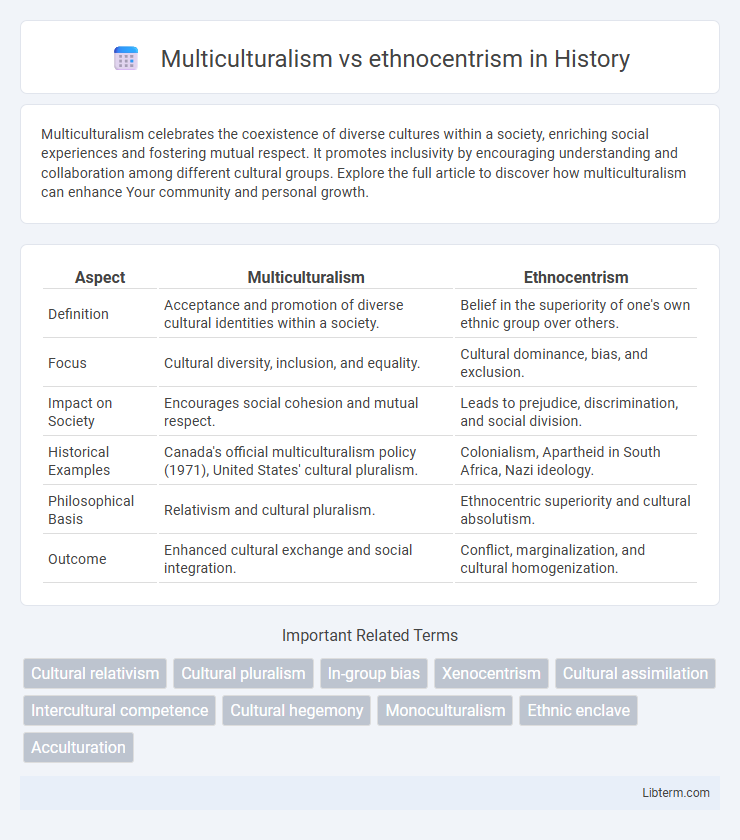Multiculturalism celebrates the coexistence of diverse cultures within a society, enriching social experiences and fostering mutual respect. It promotes inclusivity by encouraging understanding and collaboration among different cultural groups. Explore the full article to discover how multiculturalism can enhance Your community and personal growth.
Table of Comparison
| Aspect | Multiculturalism | Ethnocentrism |
|---|---|---|
| Definition | Acceptance and promotion of diverse cultural identities within a society. | Belief in the superiority of one's own ethnic group over others. |
| Focus | Cultural diversity, inclusion, and equality. | Cultural dominance, bias, and exclusion. |
| Impact on Society | Encourages social cohesion and mutual respect. | Leads to prejudice, discrimination, and social division. |
| Historical Examples | Canada's official multiculturalism policy (1971), United States' cultural pluralism. | Colonialism, Apartheid in South Africa, Nazi ideology. |
| Philosophical Basis | Relativism and cultural pluralism. | Ethnocentric superiority and cultural absolutism. |
| Outcome | Enhanced cultural exchange and social integration. | Conflict, marginalization, and cultural homogenization. |
Understanding Multiculturalism: A Comprehensive Overview
Multiculturalism promotes the coexistence of diverse cultural identities within a society, encouraging mutual respect and inclusion. It fosters social cohesion by valuing cultural differences and enabling equitable opportunities for all ethnic groups. Contrastingly, ethnocentrism centers on judging other cultures by the standards of one's own, often leading to cultural bias and social division.
Defining Ethnocentrism: Roots and Impact
Ethnocentrism originates from the tendency to view one's own culture as superior, influencing social perceptions and interactions. Rooted in cognitive biases and social identity theory, it promotes in-group favoritism while fostering prejudice and discrimination against other cultures. This mindset hampers cross-cultural understanding and perpetuates cultural conflicts in diverse societies.
Historical Perspectives on Multiculturalism and Ethnocentrism
Historical perspectives on multiculturalism reveal its evolution as societies increasingly embraced cultural diversity, fostering inclusion and social cohesion. Ethnocentrism, rooted in ancient civilizations, manifests as the belief in the inherent superiority of one's own cultural group, often leading to social exclusion and conflict. The juxtaposition of these paradigms highlights the shift from ethnocentric dominance to multicultural acceptance in modern sociopolitical thought.
Social Integration: Benefits of Multiculturalism
Multiculturalism promotes social integration by fostering mutual respect and understanding among diverse cultural groups, leading to decreased social tensions and enhanced community cohesion. It encourages inclusive policies that support equal participation in social, economic, and political activities, benefiting social stability and innovation. Embracing multiculturalism helps societies leverage diverse perspectives, enriching cultural experiences and driving social progress.
The Consequences of Ethnocentrism in Society
Ethnocentrism fosters social division by promoting the belief in the superiority of one's own cultural group, leading to prejudice and discrimination against others. This mindset hampers social cohesion and perpetuates systemic inequalities within diverse societies. In contrast, embracing multiculturalism encourages inclusivity, mutual respect, and the celebration of cultural diversity.
Multiculturalism in Education and Workplaces
Multiculturalism in education and workplaces promotes inclusivity by recognizing and valuing diverse cultural backgrounds, enhancing creativity and collaboration. Schools implementing multicultural curricula improve cultural competence, reduce prejudice, and prepare students for global citizenship. In professional settings, culturally responsive policies foster employee engagement, innovation, and decrease conflict by embracing a wide range of perspectives and experiences.
Ethnocentrism’s Influence on Policy and Governance
Ethnocentrism significantly impacts policy and governance by prioritizing the interests and cultural norms of the dominant group, often leading to exclusionary practices and systemic inequalities. Policies influenced by ethnocentric perspectives can marginalize minority communities, restrict multicultural integration, and reinforce social hierarchies based on perceived cultural superiority. This dynamic shapes legislation, law enforcement, and resource distribution, undermining efforts toward inclusive and equitable governance.
Challenges and Criticisms of Multiculturalism
Multiculturalism faces challenges such as social fragmentation, where diverse cultural groups may experience limited integration and increased segregation. Critics argue that it can lead to cultural relativism, undermining shared values and national identity. Furthermore, multicultural policies may inadvertently reinforce stereotypes and hinder cohesive social unity by emphasizing differences over commonalities.
Strategies to Combat Ethnocentrism
Promoting multicultural education and inclusive curricula helps challenge ethnocentric beliefs by fostering understanding of diverse cultural perspectives. Encouraging intercultural dialogue and collaborative community projects facilitates empathy and reduces prejudices rooted in ethnocentrism. Implementing policies that protect minority rights and promote cultural equity ensures systemic support for diversity and counters ethnocentric dominance.
Building Inclusive Communities: The Path Forward
Building inclusive communities requires embracing multiculturalism, which values diverse cultural perspectives and fosters mutual respect among different ethnic groups. Ethnocentrism, the belief in the superiority of one's own culture, undermines social cohesion and hinders collaborative progress. Prioritizing policies and educational programs that promote cultural awareness and equity supports the path forward to unity and collective growth.
Multiculturalism Infographic

 libterm.com
libterm.com